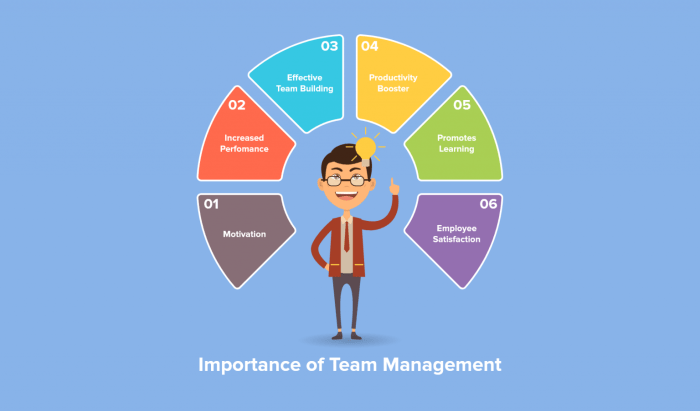Team Management Skills are the key to unlocking your team’s potential and driving success. Get ready to dive into the world of effective leadership and collaboration in the workplace.
From boosting productivity to fostering employee satisfaction, these skills are game-changers in any professional setting.
Importance of Team Management Skills
Team management skills are essential in a professional setting as they play a crucial role in fostering collaboration, communication, and productivity among team members. Effective team management can lead to improved employee satisfaction, increased efficiency, and overall success for the organization.
Enhanced Productivity and Employee Satisfaction
- Clear Communication: Strong team management skills help in establishing clear communication channels within a team, ensuring that tasks are understood and executed effectively.
- Conflict Resolution: A skilled team manager can address conflicts promptly and find solutions that satisfy all parties involved, leading to a harmonious work environment.
- Delegation of Tasks: Proper delegation of tasks based on individual strengths and skills can boost productivity and morale among team members.
Impact of Poor Team Management
- Low Morale: Inadequate team management can result in low morale among team members, leading to decreased motivation and engagement.
- Missed Deadlines: Without effective management, tasks may be poorly coordinated, leading to missed deadlines and compromised project outcomes.
- High Turnover: Poor team management can contribute to high turnover rates as employees may feel undervalued or unsupported in their roles.
Essential Team Management Skills

Effective team management requires a combination of essential skills that help leaders guide their teams towards success. These skills include communication, delegation, conflict resolution, and motivation. Each skill plays a crucial role in building a cohesive and high-performing team.
Communication
Communication is key in team management as it ensures that everyone is on the same page, understands their roles, and can collaborate effectively. Clear and open communication fosters trust among team members and prevents misunderstandings that can lead to conflicts. For example, in a project meeting, a team leader must communicate the project goals, deadlines, and individual responsibilities clearly to ensure everyone is aligned and working towards a common objective.
Delegation
Delegation is essential for effective team management as it allows leaders to distribute tasks based on team members’ strengths and expertise. Delegating responsibilities empowers team members, promotes skill development, and prevents burnout. For instance, a team leader can delegate specific tasks to different team members based on their skills and experience to ensure that the project is completed efficiently and on time.
Conflict Resolution, Team Management Skills
Conflict resolution is crucial in team management to address disagreements or misunderstandings that may arise among team members. Effective conflict resolution techniques help maintain a positive team dynamic and prevent conflicts from escalating and affecting team performance. For example, a team leader can facilitate a constructive discussion to resolve conflicts and find a mutually beneficial solution that satisfies all parties involved.
Motivation
Motivation is key to keeping team members engaged, productive, and committed to achieving team goals. A motivated team is more likely to overcome challenges, stay focused, and deliver high-quality results. For instance, a team leader can motivate team members by providing positive feedback, recognizing their achievements, and creating a supportive work environment that encourages collaboration and innovation.
Developing Team Management Skills

Developing team management skills is crucial for aspiring managers looking to lead their teams effectively. By focusing on training programs, workshops, and mentoring, individuals can enhance their abilities to build and manage successful teams.
Importance of Self-Awareness and Emotional Intelligence
Self-awareness and emotional intelligence play a key role in improving team management skills. Being aware of one’s own strengths, weaknesses, and emotions allows managers to better understand and connect with their team members. By developing emotional intelligence, managers can effectively navigate conflicts, inspire their team, and create a positive work environment.
- Practice active listening to understand team members’ perspectives and feelings.
- Seek feedback from others to gain insights into your leadership style and areas for improvement.
- Manage stress and emotions effectively to remain calm and composed in challenging situations.
- Empathize with team members to build trust and foster strong relationships.
Tips for Enhancing Team Management Abilities
Here are some tips for aspiring managers on how to enhance their team management skills:
- Set clear goals and expectations for the team to ensure everyone is aligned and working towards a common objective.
- Delegate tasks effectively by assigning responsibilities based on team members’ strengths and skillsets.
- Provide regular feedback and recognition to motivate team members and encourage continuous improvement.
- Develop strong communication skills to convey information clearly, listen actively, and resolve conflicts constructively.
Challenges in Team Management
Managing a team comes with its fair share of challenges that can test even the most experienced managers. From team dynamics to communication breakdowns and conflicting personalities, there are various obstacles that can hinder the effectiveness of a team. In order to successfully lead and manage a team, it is crucial to be aware of these challenges and have strategies in place to overcome them.
Team Dynamics
Team dynamics play a crucial role in the success of a team. It involves how team members interact, communicate, and work together towards a common goal. One common challenge faced by managers is dealing with conflicts within the team. These conflicts can arise due to differences in opinions, personalities, or work styles. To overcome this challenge, successful managers focus on fostering open communication, promoting collaboration, and resolving conflicts in a constructive manner.
Communication Breakdowns
Effective communication is key to the success of any team. However, communication breakdowns can occur due to various reasons such as unclear expectations, poor listening skills, or lack of feedback. Managers need to ensure that communication channels are open, transparent, and efficient within the team. Strategies to overcome communication breakdowns include regular team meetings, clear communication protocols, and active listening to ensure that all team members are on the same page.
Conflicting Personalities
Dealing with conflicting personalities is another common challenge in team management. Different team members may have varying work styles, values, or approaches to problem-solving, which can lead to friction within the team. Successful managers address this challenge by promoting a culture of respect, understanding, and appreciation for diversity. They also focus on leveraging the strengths of each team member and finding common ground to work towards shared goals.
